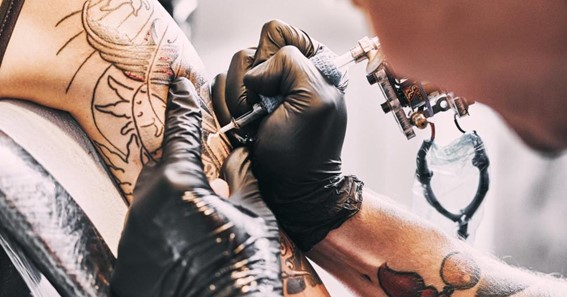Tattoos are a form of permanent body art that can be difficult to remove. While some individuals are content with the tattoos they have, others may find that they no longer want their tattoos and seek to have them removed.
There are various tattoo removal methods available, but they can be expensive, painful, and may result in scarring. As an alternative, tattoo cover-ups have become a popular solution for individuals who want to alter their tattoos.
A cover-up involves covering the existing tattoo with a new design that covers or blends in with the old one. In this article, we will explore some fading techniques for improving tattoo cover-ups.
Laser Removal:
One of the most common fading techniques for tattoo cover-ups is laser removal. Lasers work by breaking down the tattoo ink into smaller particles, which are then absorbed by the body. This lightening of the tattoo makes it easier for an artist to cover up the existing tattoo with a new design.
This method can be used to remove some or all of the original tattoo ink, depending on the desired outcome. People frequently ask how many sessions to remove a tattoo is required using this procedure.
This is one of the most effective methods for fading tattoos. The laser light is directed at the tattooed area, breaking down the ink particles and allowing the body to naturally remove them. The process is repeated multiple times until the desired level of fading is achieved.
Click here – What Is A Ditty Bag?
Chemical Peels:
Another method for fading tattoos is chemical peels. This technique involves applying a chemical solution to the tattoo that removes the top layer of skin, lightening the tattoo. Chemical peels can be performed in a medical setting or at home with over-the-counter products. However, it’s important to note that chemical peels can be painful and can result in scarring if not performed correctly.
Topical Creams:
Topical creams that contain lightening agents such as hydroquinone and kojic acid can be used to lighten tattoos. These creams are applied directly to the tattoo and work by breaking down the tattoo ink. The results can be gradual, so this method may not be the best option for individuals who want quick results.
Exfoliation:
Exfoliating the skin can also help to fade tattoos. This can be done through the use of physical exfoliants such as scrub brushes or chemical exfoliants such as alpha-hydroxy acids. Exfoliating the skin removes the top layer of skin, lightening the tattoo. This method can be done at home or in a medical setting and is relatively painless.
Dermabrasion:
This method uses a spinning tool to abrade the surface of the skin and remove the top layers of the tattoo. This technique can cause scarring, so it is important to have a professional perform the procedure.
Tattoo lightening creams:
These topical creams contain ingredients such as hydroquinone, kojic acid and glycolic acid that can help to fade tattoos over time. The creams must be applied regularly for several months to achieve noticeable results.
Click here – How to find cheap rental car prices?
Salabrasion:
This technique involves scrubbing the tattooed area with salt and water to remove the top layers of skin and lighten the tattoo. The process is followed by the application of a topical ointment to reduce the risk of infection.
Tattoo cover-up:
This technique involves applying a new tattoo over the existing design, effectively hiding it. The new design must be larger and darker than the original tattoo to ensure adequate coverage.
Conclusion
In conclusion, there are various fading techniques for improving tattoo cover-ups. From laser removal to chemical peels and topical creams to exfoliation, individuals who want to alter their tattoos have several options to choose from. It’s important to consider the cost, pain, and potential side effects of each method before making a decision.
It’s also important to remember that tattoo cover-ups can be a complex process and may require multiple treatments to achieve the desired result. To ensure the best outcome, it’s recommended that individuals work with an experienced tattoo artist who specializes in cover-ups.

